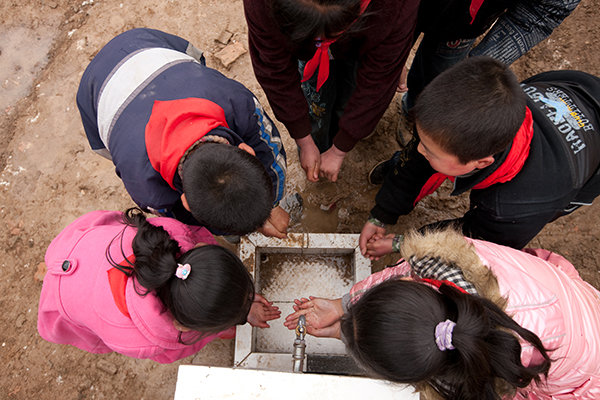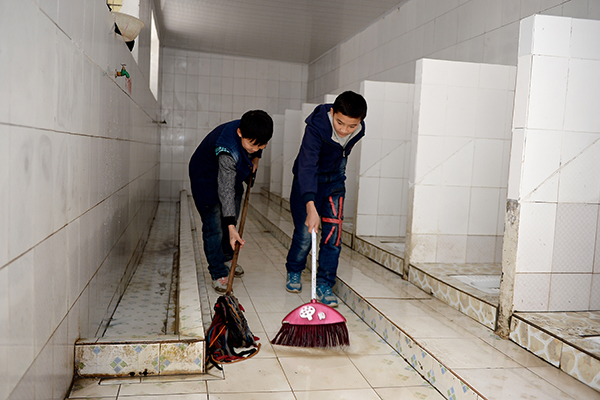By Kelly Ann Naylor
"The future depends on what we do in the present."
Mahatma Gandhi's words floated through my mind as my flight landed in Beijing. I had a full schedule ahead of me, focused on initiatives that could make the current global sanitation crisis a thing of the past.
There's a toilet revolution in China and it's not difficult to understand why. Over 20 million people in the country practice open defecation. That's nearly 150 times the capacity of the world's largest stadium, using street corners, car parks and fields as a toilet. For children, a lack of toilets can be devastating. In communities where there is human waste in the environment, diseases spread rapidly. Children are at risk of diarrhoea, malnutrition and even death.
|

©UNICEF/UNI97130/Zhao
Boys and girls wash their hands during recess at Caochuan Primary School, Xihe County, Gansu Province, China. |
All eyes are on China as it seeks to revolutionize the toilet by increasing access to sanitation for all. What happens today in China has the potential to impact not just its 1.4 billion citizens, but billions of others in the world.
Toilet revolution
The term revolution is not normally associated with toilets, but in this case, it is entirely fitting. A revolution is commonly understood as an upheaval and dramatic change to a way of life. For toilets, this means developing innovative and sustainable designs, generating new markets, and working with communities to develop new social norms and behaviours around toilet use. In China, the scale of this revolution is huge.
|

©UNICEF/China/2015/Xia Yong
Two students clean the toilet in Xianlong Primary School in Zhong County, Chongqing, China. |
Since 2013, the toilet revolution's success has been due largely to strong political leadership, healthy financial investment, and prioritization at a local level. However, there is still a long way to go.
China is one of 193 countries working towards achieving the Sustainable Development Goals. The goal for water and sanitation, SDG6, calls for everyone to have access to a “safe toilet” by 2030. That means 4.5 billion people across the world and 555 million in China need to start using a toilet that is the right quality and has a waste management system, in the next 12 years. And not just toilets at home, but toilets in schools and hospitals as well.
I was inspired by the budding engineers I met at Nankai University. Like them, hundreds of students across the world are engaged in an international competition to present innovative solutions for the global sanitation problem using low-cost water-saving technologies. It's exciting to know that a generation of experts are involved in finding long-term sustainable solutions.
|

©www.meipian.cn/c/5246753
The author Kelly-Ann Naylor, Chief of Water, Sanitation and Hygiene at UNICEF, listens as students from Nankai University present innovative solutions for improving water and sanitation in China. |
The Reinvented Toilet Expo
To reach everyone and achieve this ambitious goal, we need to work in innovative ways on an unprecedented scale. Not just in China, but around the world.
At the Reinvented Toilet Expo, hosted by Bill and Melinda Gates in Beijing, UNICEF launched a new strategy that aims to revolutionise the way sanitation services are delivered. The Sanitation Market Shaping Strategy shows how we can work with the private sector on a massive scale to make sure people everywhere have access to safe and sustainable toilets. It outlines how to work through public private partnerships, combining innovation, market reach and research to reach more people in the coming years.
A global revolution
Gandhi's words spoken decades ago, still ring true today — the future depends on our actions now. I am excited for the future and to see the outcome of a toilet revolution in China, and in other countries around the world.
Investing in sanitation today will create a future where our children can grow up in a clean and safe environment.
Kelly Ann Naylor is the Chief of Water, Sanitation and Hygiene at UNICEF, HQ.































